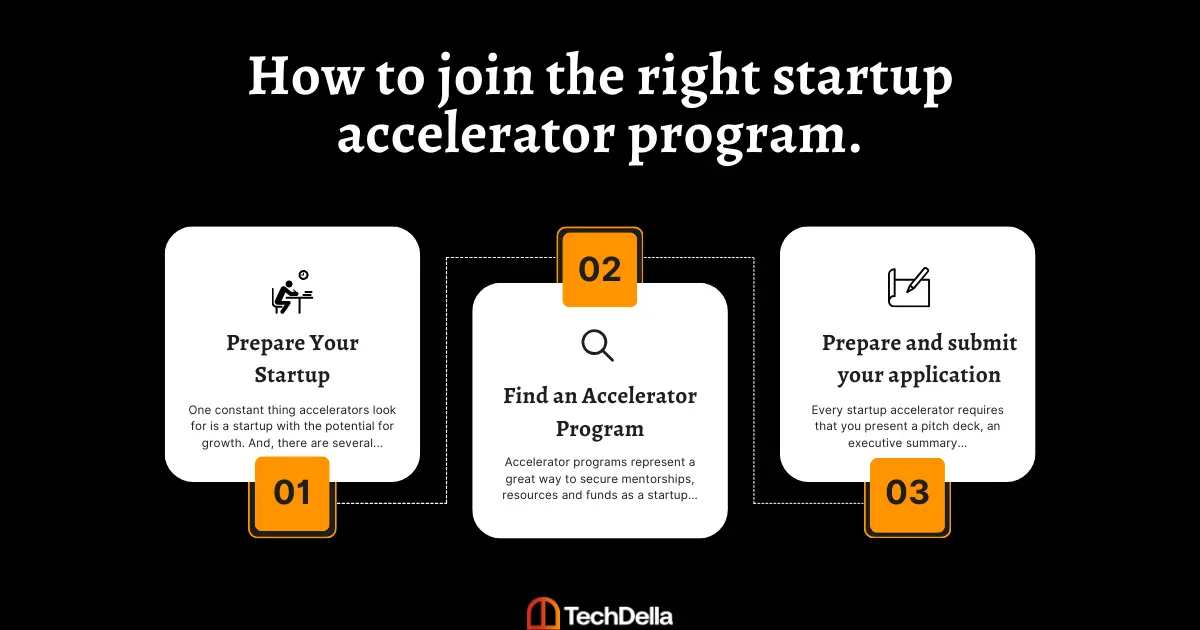
As an entrepreneur, you’ll always look for more ways for business growth. While that’s a great thing, such ways are not easily found. But a startup accelerator program ticks all the boxes.
In case you have no idea what a startup accelerator program is, this article is for you. Read on for details on accelerator programs and how to find the right one.
What is a Startup Accelerator?
A startup accelerator, also called a seed accelerator, is a business program that offers early-stage companies what they need to grow. Typically, accelerator programs provide startups with mentorships, education, and most importantly, financing. These benefits resolve the pain points of most startup companies. Startup accelerator programs run for a fixed period of time, say, 3-6 months, then the startups run independently.
As a matter of fact, many popular companies got assistance from accelerators in their early days. For example, Silicon Valley Accelerator and ‘Plug and Play’ Tech Centre helped Google, PayPal, and Zoosk build their ideas into successful businesses. So, you have an image of how accelerators can help your startup.
Startups that wish to join these programs send in their applications, while the accelerator scrutinises each application. The program then admits as many as they want and splits them up into batches throughout the year. So, your startup business won’t walk alone.
In return for the benefits—guest speakers, advising hours, a negotiated amount of capital, and maybe a shared coworking space—the host company gets around 3% to 8% ownership of the company. This may sound like a lot, but you’ll get massive benefits as compensation.
Naturally, startup accelerators are easily mistaken for other early-stage business support alternatives—angel investors, venture capitalists, and startup incubators. What sets accelerators apart is their fixed-term, short-term, cohort-based, and mentorship-method nature. Even more, the highly competitive application processes coupled with the seed capital for equity features differentiate it from others. Also, unlike others, accelerator programs educate the whole team rather than just the founder.
Fun fact: Startup accelerator programs stand to gain a lot when your business thrives after graduation. So, they’ll ensure you’re well-equipped to succeed.
If you’re considering this path and want help finding the right fit or preparing your startup to apply, Techdella’s startup solutions can guide you every step of the way from strategy to execution.
Does the idea of an accelerator program sound good to you? Here’s how to join one.
How To Join The Right Startup Accelerator Program
Joining a startup accelerator requires adequate preparations due to the competitive nature of the process. Here are some steps to help you beat the crowd.
 1. Prepare your startup
1. Prepare your startup
-
One constant thing accelerators look for is a startup with the potential for growth. And, there are several features an enterprise without a vision lacks. So, you need to put your startup in the best position possible.
Develop your business to the best possible point with a good business model, product concept, and value proposition. All these show the validity and profitability of your idea. Also, develop an MVP (minimum viable product) if you don’t have one to show you’ve passed the ‘idea’ stage, and since you’ve gained market validation, your startup becomes one step closer to admission.
In addition, startup accelerators often prioritise startups with a committed team over a one-man show. So, make sure you assemble a team of skilled workers for better chances.
Then define your goals. What exactly does your business need presently? Are you looking for funding? Or it’s more of mentorship?. Once you understand your goals, the options become few.
Need help creating a good business plan that gets noticed? Check out our beginner-friendly guide on [How to Write a Good Business Plan], perfect for startup founders preparing for accelerator applications.
2. Find an accelerator program
Accelerator programs represent a great way to secure mentorships, resources, and funds as a startup. But finding the right one for your business can be stressful. So, here’s how you can find an accelerator.
Identify your needs and goals; some accelerators target early-stage startups while others focus on more developed startups. So, you need to know where you fall.
Do you need local accelerators, or don’t you mind the international ones?,
Also, check out popular accelerator programs; they might be what you need. Here are some popular startup accelerators you can check.
- Y Combinator
- Techstars
- 500 startups
- Masschallenge
- Google for a startup accelerator.
- Rock Health and IndieBio for the health and biotech industry
- Startupbootcamp fintech for the fintech industry
- Uncharted and village capital for the social impact industry.
Use online platforms: There are several platforms built to help you find the right accelerator programs, e.g., F6S, AngelList, Gust, etc. You can find programs based on your industry and location with these online platforms.
Seek recommendations: reach out to founders who have gone through accelerators for their experiences and advice. That way, you avoid choosing an infamous company. Also, if you are affiliated with a university or research institute, check if they offer accelerator programs or partnerships with other accelerators. These ones are usually credible and come with high recommendations. Lastly, nothing beats word of the streets; go out to networking events, conferences, etc., for more information.
Check the program’s requirements: each program has its own requirements. For instance, IndieBio caters to the biotech industry, so it can’t admit a fintech startup. Some focus on idea-level startups, while others target more advanced startups. So, know exactly what each program requires, then measure your startup against it.
Remember to understand the terms before applying.
3. Prepare and submit your application
Every startup accelerator requires that you present a pitch deck, an executive summary (1 or 2-page overview), and it should outline your business in a few words. Here’s what your pitch deck should contain:
- The problem you’re solving
- Your solution (product or service)
- Market opportunity (size, target market, potential growth)
- Business model (how you’ll make money)
- Traction (early customers, revenue, partnerships)
- Team (the expertise of your founding team)
- Financials (funding needs and projections)
Tip: Actually, it’s better if you hire a pitch deck expert to write one for your business. They’d know how best to fluff up your startup’s image.
In addition, some accelerators may ask for a short video pitch, say 1-2 minutes long. It’s another opportunity to demonstrate your passion and strike a personal connection with the audience.
Once your application is ready, it’s submission time. While you may not feel the rush, many applications have a deadline, so keep track of them. If your application is accepted, you may receive an invitation for an interview. So, be prepared to deliver a short, detailed pitch and answer any questions about your team, plan, and business in general that they may have. Try to show that you’re open to feedback and mentorship.
Pro tip: Apply to as many accelerator programs as possible, be strategic about it, though; pick programs relevant only to your niche.
Conclusion
Finding accelerators for startups isn’t so difficult; you just need to know where to look. With this article, we believe you know how to find and join the right startup accelerator program. So here’s what to expect if you’re accepted into a startup accelerator:
- Equity Exchange (if applicable): Get ready to pay for the mentorship and funding with equity in your startup.
- Mentorship: You will get guidance from experienced entrepreneurs and investors.
- Intensive Program: Most accelerator programs run for 3-6 months.
- Demo Day: At the end of the program, accelerators host a demo day, giving participants the opportunity to present their businesses to investors and stakeholders to secure funding and/or partnerships.
Remember to leverage the accelerator’s network to build connections that can support your growth long after the program ends. Many also offer post-program support, alumni networks, and access to exclusive events.
Related Marketing Strategies

eCommerce CRO Agency: How to Choose the Right One for Your Store

How to Create a Brand Identity for Your Startup


